
Ferrari has announced its decision to accept cryptocurrency payments across Europe. This bold step, following the successful implementation of crypto payments in the United States last year, marks a significant milestone in the adoption of digital currencies by high-end brands. As the iconic Italian supercar manufacturer embraces this cutting-edge technology, it’s not just changing how people buy luxury vehicles – it’s reshaping the entire landscape of high-value transactions in the digital age.
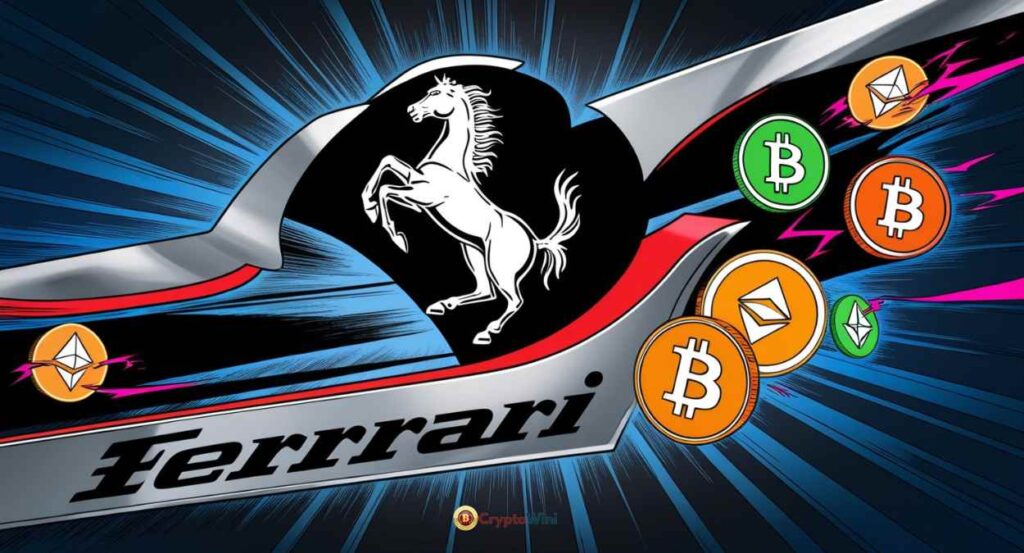
Ferrari Enables Cryptocurrency Payments In Europe
Ferrari’s expansion of cryptocurrency payments to Europe is more than just a business decision; it’s a statement about the future of finance and luxury goods. By allowing customers to purchase their dream cars using digital currencies like Bitcoin, Ethereum, and USD Coin, Ferrari is positioning itself at the forefront of financial innovation in the automotive sector. This move not only caters to the evolving needs of their tech-savvy clientele but also signals a broader shift in how we perceive and use digital assets in everyday transactions.
As we delve deeper into this exciting development, we’ll explore the implications for Ferrari, the luxury car market, and the wider cryptocurrency ecosystem. From the technical aspects of implementing crypto payments to the potential impact on Ferrari’s global sales strategy, this article will provide a comprehensive look at a pivotal moment in the intersection of traditional luxury brands and cutting-edge financial technology.
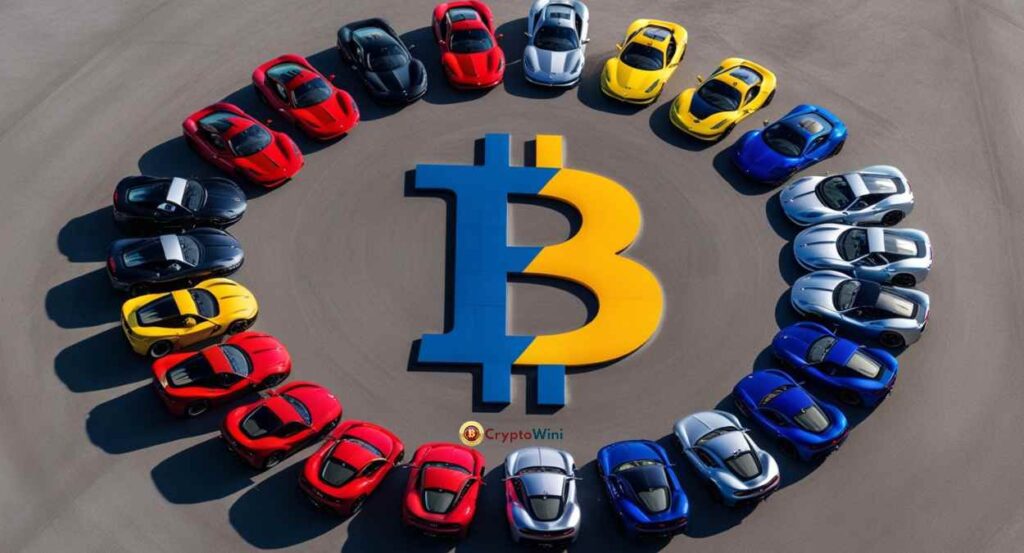
The Journey of Ferrari’s Crypto Adoption
From U.S. Launch to European Expansion
Ferrari’s foray into the world of cryptocurrency payments began in October 2023 when the company first introduced this option in the United States. The initial rollout was a calculated move, allowing Ferrari to test the waters in one of the world’s largest luxury car markets. The success of this initiative in the U.S. paved the way for the company’s decision to expand the service to Europe.
Key Milestones in Ferrari’s Crypto Journey:
- October 2023: Launch of cryptocurrency payments in the United States
- July 2024: Planned expansion of crypto payments to European dealerships
- End of 2024: Projected global rollout to other markets where cryptocurrencies are legally accepted
This phased approach demonstrates Ferrari’s commitment to innovation while ensuring a smooth and secure implementation of the new payment system.
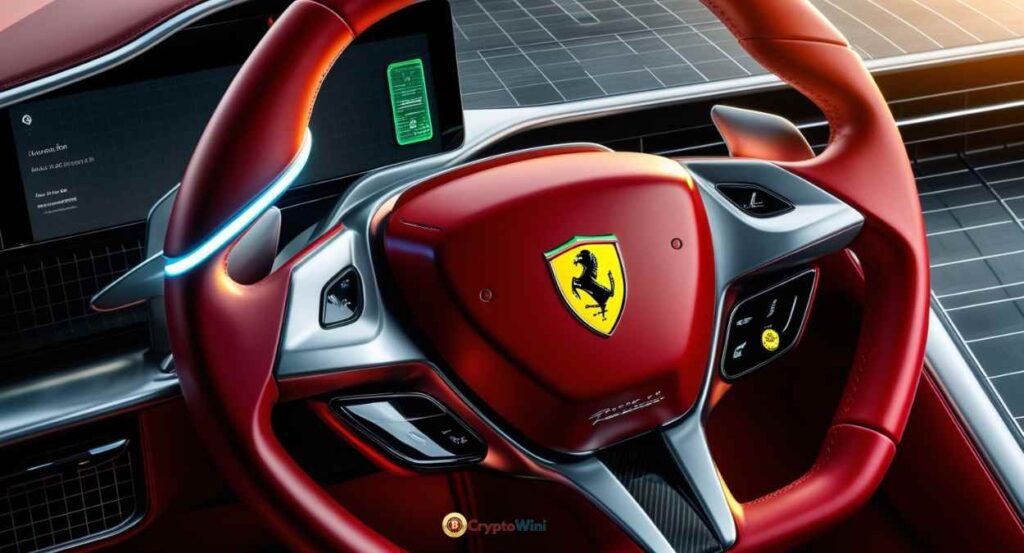
Partnering with BitPay
To facilitate cryptocurrency transactions, Ferrari has partnered with BitPay, a leading cryptocurrency payment service provider. This collaboration ensures that Ferrari can accept digital currencies without directly handling them, mitigating potential risks associated with cryptocurrency volatility.
Cryptocurrencies Accepted by Ferrari:
| Cryptocurrency | Symbol |
|---|---|
| Bitcoin | BTC |
| Ethereum | ETH |
| USD Coin | USDC |
By accepting these major cryptocurrencies, Ferrari is catering to a wide range of crypto enthusiasts and investors.
The European Rollout
The expansion of cryptocurrency payments to Europe is set to be completed by the end of July 2024. This move is particularly significant given Europe’s diverse financial landscape and varying attitudes towards digital currencies across different countries.
Ferrari’s statement on the European expansion: “The entry into the European market follows the successful launch of this alternative payment system in the United States less than a year ago, to support dealers in better addressing the evolving needs of its clients.”
The Technology Behind Ferrari’s Crypto Payments
Ensuring Transaction Security
Ferrari’s implementation of cryptocurrency payments is built on a foundation of robust security measures. The company has partnered with multiple cryptocurrency payment firms to create a system that prioritizes the safety of both the customer and the dealership.
Key Security Features:
- Instant Conversion: Cryptocurrencies are immediately converted to traditional currencies, protecting dealers from market volatility.
- Fund Source Verification: The system includes measures to verify the legitimacy of the cryptocurrency’s source.
- Exchange Rate Protection: Transactions are safeguarded against sudden fluctuations in exchange rates.
The Dealer Experience
For Ferrari dealers, the adoption of cryptocurrency payments represents a significant technological leap. However, the company has designed the system to be as seamless as possible for its dealership network.

How It Works for Dealers:
- Dealers accept cryptocurrency payments without directly managing digital assets.
- The payment system handles the conversion to traditional currency.
- Dealers receive the payment in their local currency, eliminating the need for them to navigate the complexities of the crypto market.
Integration with Existing Systems
Ferrari’s cryptocurrency payment system is designed to work alongside traditional payment methods, offering customers more choices without disrupting existing processes.
The Impact on Ferrari’s Business Model
Appealing to a New Customer Base
By accepting cryptocurrencies, Ferrari is positioning itself to attract a new demographic of customers – tech-savvy individuals who have accumulated wealth through cryptocurrency investments.
Potential New Customer Segments:
- Young tech entrepreneurs
- Crypto millionaires and billionaires
- Forward-thinking traditional investors diversifying into digital assets
Global Market Strategy
Ferrari’s phased rollout of cryptocurrency payments aligns with its global market strategy. By starting in the U.S., expanding to Europe, and planning for further global implementation, Ferrari is methodically increasing its reach in the digital economy.
Projected Global Rollout:
| Region | Implementation Date |
|---|---|
| United States | October 2023 |
| Europe | July 2024 |
| Other Markets | End of 2024 |
Brand Positioning in the Digital Age
Accepting cryptocurrencies reinforces Ferrari’s image as a forward-thinking luxury brand. It aligns the company with the values of innovation and technological advancement, which are key selling points for many high-net-worth individuals.

The Broader Implications for the Luxury Auto Industry
Setting a New Standard
Ferrari’s move to accept cryptocurrencies could set a new standard in the luxury automotive sector. As one of the most prestigious brands in the industry, Ferrari’s actions are likely to influence competitors and potentially spark a wave of crypto adoption among high-end car manufacturers.
Potential Industry-Wide Changes:
- Increased Crypto Acceptance: Other luxury brands may follow suit to remain competitive.
- Enhanced Digital Payment Infrastructure: The industry might see increased investment in digital payment technologies.
- Shifting Customer Expectations: Buyers may begin to expect cryptocurrency payment options as standard in the luxury segment.
Challenges and Opportunities
While the adoption of cryptocurrency payments presents numerous opportunities, it also comes with its set of challenges for the luxury auto industry.
Opportunities:
- Access to a new customer base
- Potential for increased global sales
- Enhanced brand image as an innovator
Challenges:
- Regulatory compliance across different jurisdictions
- Potential volatility in cryptocurrency markets
- Need for staff training and new security measures

The Role of Cryptocurrencies in High-Value Transactions
Breaking Down Barriers
Cryptocurrencies are particularly well-suited for high-value transactions like luxury car purchases. They offer several advantages over traditional payment methods for both buyers and sellers.
Advantages of Crypto for High-Value Purchases:
- Speed: Transactions can be completed quickly, regardless of banking hours or international boundaries.
- Reduced Fees: Cryptocurrency transactions often involve lower fees compared to traditional international wire transfers.
- Privacy: While not completely anonymous, crypto transactions offer a degree of privacy that appeals to some high-net-worth individuals.
Case Study: A Ferrari Purchase with Bitcoin
To illustrate the process, let’s consider a hypothetical scenario of a customer purchasing a Ferrari using Bitcoin.
- Customer Selection: The buyer chooses their Ferrari model at a dealership in Milan.
- Payment Initiation: At the point of sale, the customer opts to pay with Bitcoin.
- Conversion Rate Lock: The dealership provides a Bitcoin address and locks in the current exchange rate for a set period.
- Transaction Execution: The customer transfers the required amount of Bitcoin from their wallet.
- Verification: The blockchain confirms the transaction.
- Dealer Receipt: The dealership receives the equivalent amount in Euros, converted instantly by the payment processor.
- Documentation: The sale is recorded, with the Bitcoin transaction hash serving as proof of payment.
This process demonstrates how cryptocurrency can streamline high-value purchases, making them faster and potentially more convenient for international buyers.
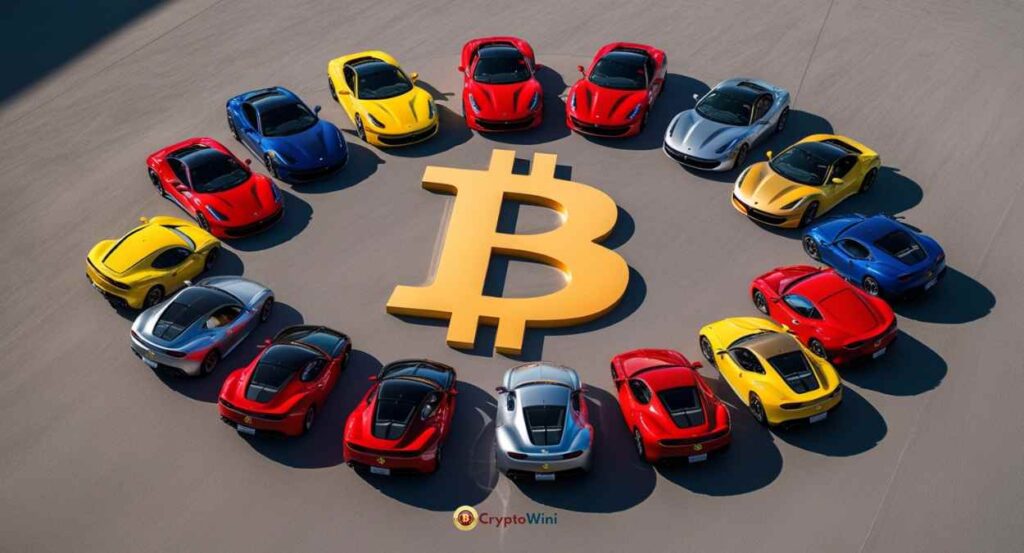
The Future of Crypto in the Automotive Industry
Beyond Payments: Blockchain in Automotive
While Ferrari’s focus is currently on accepting cryptocurrencies as payment, the underlying blockchain technology has broader potential applications in the automotive industry.
Potential Blockchain Applications in Automotive:
- Supply Chain Management: Tracking parts and materials from source to final product.
- Vehicle History: Creating immutable records of a car’s history, including ownership, maintenance, and accidents.
- Smart Contracts: Automating processes like leasing, insurance, and even self-driving car transactions.
Predictions for the Next Decade
As cryptocurrencies and blockchain technology continue to evolve, their role in the automotive industry is likely to expand.
Potential Developments by 2034:
- Widespread acceptance of major cryptocurrencies across all car brands
- Blockchain-based vehicle registration and titling systems
- Cryptocurrency rewards programs for loyal customers
- Decentralized autonomous organizations (DAOs) owning and operating fleets of luxury vehicles
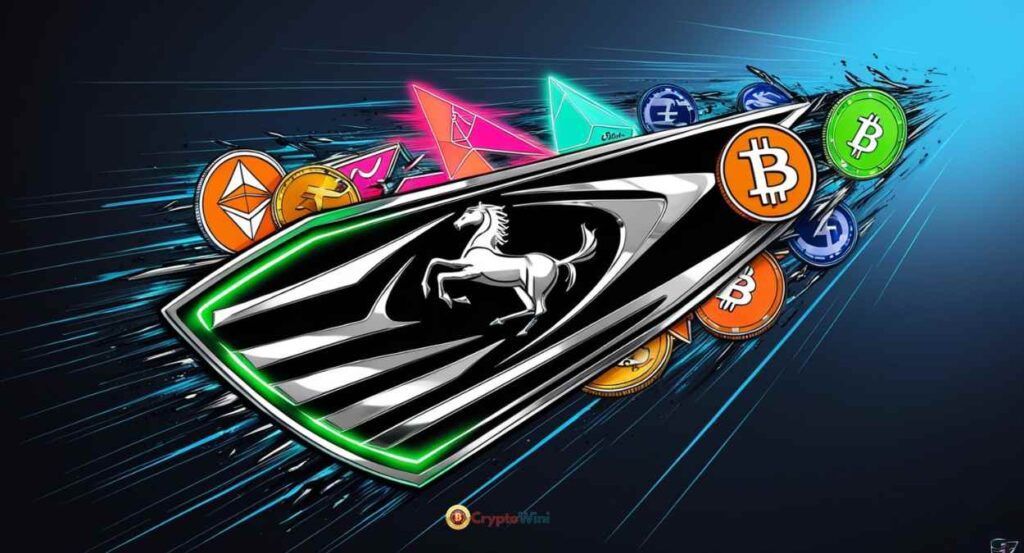
Frequently Asked Questions (FAQs)
Q. Why is Ferrari accepting cryptocurrency payments?
A. Ferrari is accepting cryptocurrency payments to cater to the evolving needs of its clients, particularly tech-savvy customers who prefer digital currencies. This move also positions Ferrari as an innovative leader in the luxury automotive market.
Q. Which cryptocurrencies does Ferrari accept?
A. Currently, Ferrari accepts Bitcoin (BTC), Ethereum (ETH), and USD Coin (USDC) for payments.
Q. How does Ferrari handle the volatility of cryptocurrencies?
A. Ferrari partners with cryptocurrency payment processors that instantly convert the digital currencies into traditional money, protecting both the company and its dealers from market fluctuations.
Q. Will all Ferrari dealerships in Europe accept cryptocurrency?
A. Most Ferrari dealerships in Europe are either adopting or in the process of adopting the new cryptocurrency payment system alongside traditional methods.
Q. Is buying a Ferrari with cryptocurrency more expensive?
A. The cost of the car remains the same regardless of the payment method. However, cryptocurrency transactions might involve different fees compared to traditional banking methods.
Q. Can I get a refund in cryptocurrency if I return my Ferrari?
A. Refund policies may vary, but typically, refunds would be processed in the local currency equivalent to the original cryptocurrency payment at the time of the refund.
Q. Will Ferrari expand cryptocurrency payments to other markets?
A. Yes, Ferrari plans to extend the cryptocurrency payment service to other markets by the end of 2024, where cryptocurrencies are legally accepted.
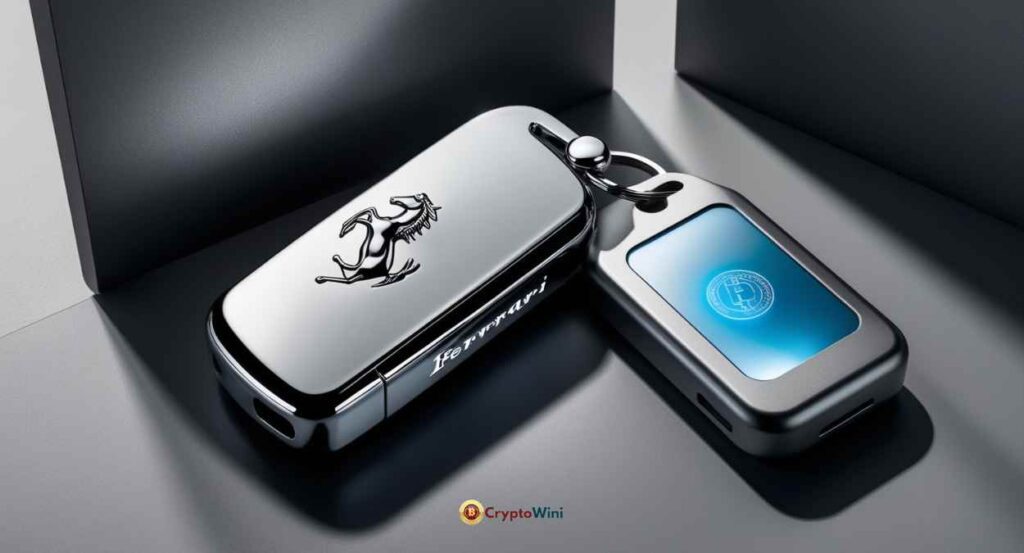
Conclusion
Ferrari’s decision to enable cryptocurrency payments in Europe marks a significant milestone in the convergence of traditional luxury brands and digital finance. This move not only demonstrates Ferrari’s commitment to innovation but also signals a broader shift in how high-value transactions may be conducted in the future.
As cryptocurrencies continue to gain mainstream acceptance, we can expect to see more luxury brands following Ferrari’s lead. This trend could reshape not just the automotive industry, but the entire landscape of luxury goods and services. For consumers, it means more options and potentially smoother transactions. For businesses, it opens up new markets and opportunities.
The road ahead for cryptocurrency in the automotive world is exciting and full of potential. As Ferrari leads the charge, we’re witnessing the beginning of what could be a transformative era in luxury car sales and beyond. The success of this initiative in Europe will likely set the tone for global adoption, making this a pivotal moment in the history of both the automotive and cryptocurrency industries.
Disclaimer:
The information provided on CryptoWini is for general informational purposes only. While we strive to keep the information up to date and correct, we make no representations or warranties of any kind, express or implied, about the completeness, accuracy, reliability, suitability, or availability with respect to the website or the information, products, services, or related graphics contained on the website for any purpose.
Also Read :
What Is Sui Crypto? A Comprehensive Guide To The Innovative Blockchain Platform
Crypto-js NPM: A Comprehensive Guide to JavaScript Cryptography
Embracing the Future: Your Ultimate Guide to Crypto Payment Gateways in 2024
AI Crypto Scams: The Invisible Threat You Can’t Ignore
What Is A Crypto Airdrop? A Beginner’s Guide To Free Tokens And Risks
Binance’s Major Shake-Up: Delisting, Leverage Updates, and the Crypto Exodus






























